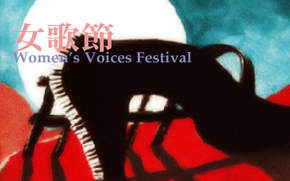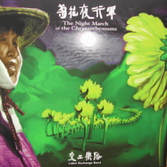關於大大樹 About Trees Music & Art
音樂叢林裡的辛勤園丁
—鍾適芳與「大大樹音樂圖像」
文.張世倫(原載於《光華雜誌》第三十卷 第九期 中華民國94年9月)
|
2005年的第11屆「野台開唱」,3天的搖滾樂團接力演唱,照舊充滿了無數激動又狂放的青春怒吼。但在一個安靜的黃昏舞台上,客家歌手林生祥用自己的節奏與步調,沈穩又堅定地唱出一條條抗議歌謠,不用大聲叫囂,省去無謂吼叫,句句充滿社會意識的歌詞,卻比在場所有放大音量的搖滾樂團更有撼動人心的力量。
正如林生祥彷彿不屬於這場搖滾盛宴,為他發行唱片的「大大樹音樂圖像」,在台灣的唱片市場裡也以專注世界民族音樂,堅持文化理念而獨樹一格。這家規模看似渺小的獨立廠牌,何以在音樂界形成一股重要的文化力量?相較於主流唱片產業,這家小公司又有何特殊的核心價值與經營理念? 2005年的金曲獎,照舊星光燦爛,仍然爭奇鬥豔。媒體焦點,還是集中在天王天后上。但出乎媒體意料的是,獲得最多獎項的音樂作品,不是主流唱片的商業鉅作,而是「大大樹音樂圖像」替「生祥與瓦窯坑3」發行的專輯《臨暗》,而這已經不是大大樹在金曲獎中第一次滿載而歸了。 |
成立於1993年的大大樹音樂圖像,主要致力於歐美主流音樂以外的世界民族音樂推廣工作。聊到金曲獎時,大大樹負責人鍾適芳強調得獎不是她們最在意的事,她更希望大大樹的音樂理想與文化精神,能有機會讓更多人聽到。
那麼,究竟大大樹的音樂理念是什麼?鍾適芳又為何會對世界民族音樂著迷,並創立台灣唯一專門經營這類音樂的獨立廠牌呢?
那麼,究竟大大樹的音樂理念是什麼?鍾適芳又為何會對世界民族音樂著迷,並創立台灣唯一專門經營這類音樂的獨立廠牌呢?
來自毛利族的音樂啟蒙
自小,鍾適芳就是個音樂愛好者,「只要有零用錢,我幾乎都拿去買唱片」。但和一般搖滾青年或民歌少女不同的是,她很早就有與非主流民族音樂接觸的經驗。
鍾適芳最早的音樂啟蒙,來自幼時有回與姊姊看電視,螢幕上突然介紹起紐西蘭毛利族的音樂,那是當年資訊閉塞的台灣難得聽聞的珍稀聲響,讓兩姊妹大感驚奇。由於下週還要介紹,兩人於是興致勃勃地準備當時還算稀有的錄音機,將節目完整地錄下來,反覆聆聽。這捲珍貴的卡帶,鍾適芳到現在還保存著。
政大西語系畢業後,鍾適芳到英國念了心理分析的碩士學位。回到台灣,也一度考慮人生接下來要怎麼走。熱愛音樂,充滿理想的她,最後還是決定做唱片,「因為台灣人的聆聽經驗實在太狹隘單一了。」1993年,她成立「大大樹音樂圖像」,立志引進並製作世界各地的民族音樂。
鍾適芳最早的音樂啟蒙,來自幼時有回與姊姊看電視,螢幕上突然介紹起紐西蘭毛利族的音樂,那是當年資訊閉塞的台灣難得聽聞的珍稀聲響,讓兩姊妹大感驚奇。由於下週還要介紹,兩人於是興致勃勃地準備當時還算稀有的錄音機,將節目完整地錄下來,反覆聆聽。這捲珍貴的卡帶,鍾適芳到現在還保存著。
政大西語系畢業後,鍾適芳到英國念了心理分析的碩士學位。回到台灣,也一度考慮人生接下來要怎麼走。熱愛音樂,充滿理想的她,最後還是決定做唱片,「因為台灣人的聆聽經驗實在太狹隘單一了。」1993年,她成立「大大樹音樂圖像」,立志引進並製作世界各地的民族音樂。
音樂背後的土地與思想
大大樹除了代理發行來自歐、亞、非等地的音樂外,並大量參與音樂製作。合作對象除了台灣的客家歌手林生祥、阿美族的檳榔兄弟外,還包括內蒙古出身,目前主要在歐洲發展的歌手烏仁娜。
鍾適芳音樂製作的觸角不限本土,對她來說,地域不是重點,「重點是音樂要成熟,要言之有物,在他們的歌曲背後,必須要有深厚的土地與思想支撐著!」
鍾適芳音樂製作的觸角不限本土,對她來說,地域不是重點,「重點是音樂要成熟,要言之有物,在他們的歌曲背後,必須要有深厚的土地與思想支撐著!」
談及音樂製作的倫理,鍾適芳認為,「音樂在這些音樂家的生命裡,本來就是完整的,製作人的職責,只在於幫他們把音樂呈現出來。對於他們背後的文化根源與音樂傳統,製作人無法、也不該妄加竄改。」
正是這種對音樂根源的堅持,使得鍾適芳非常反對只將異民族樂曲當作奇風異俗或異國情調的「取樣」手法。台灣聽眾對這個十分普遍的流行音樂手法應該不會陌生,當年英國「謎」合唱團取樣了台灣原住民郭英男的吟唱,卻只是營造出一種毫無歷史深度與音樂脈絡的異國情調與神秘感,「裡面不但沒有音樂上的平等對話,更欠缺對異文化的尊重,這是我極力反對的。」
對鍾適芳來說,音樂可以勇於混種,傳統音樂可以大膽創新,樂手可以跨界合作,但一定要奠基於樂手本身有豐富的文化基礎,並且對其合作對象有充分的尊重與理解,合作起來才有深度,不至於空泛媚俗。
正是這種對音樂根源的堅持,使得鍾適芳非常反對只將異民族樂曲當作奇風異俗或異國情調的「取樣」手法。台灣聽眾對這個十分普遍的流行音樂手法應該不會陌生,當年英國「謎」合唱團取樣了台灣原住民郭英男的吟唱,卻只是營造出一種毫無歷史深度與音樂脈絡的異國情調與神秘感,「裡面不但沒有音樂上的平等對話,更欠缺對異文化的尊重,這是我極力反對的。」
對鍾適芳來說,音樂可以勇於混種,傳統音樂可以大膽創新,樂手可以跨界合作,但一定要奠基於樂手本身有豐富的文化基礎,並且對其合作對象有充分的尊重與理解,合作起來才有深度,不至於空泛媚俗。
「世界音樂」爭議
「西方音樂」在世界各地流行,雖然方便了不同區域間的音樂交流,但它起源於歐美唱片工業的「西方觀點」本質,以及「誰有權力定義世界音樂?」的爭議,導致這個用語被不少人批判質疑。
大大樹的工作內容,雖然屬於人們想像中的世界音樂範疇,但她們儘量避免使用這個定義空泛,指涉籠統的名詞。鍾適芳說,每個音樂家與他們的作品,背後都有獨特深厚的文化背景與歷史脈絡,「他們不能,也不該被一個西方定義的行銷名詞所涵蓋。因此我們的作品會花非常大的篇幅,闡述音樂背後的故事與背景。」藉由這種方式,大大樹希望每個創作者獨特的文化主體性能被彰顯。
大大樹的工作內容,雖然屬於人們想像中的世界音樂範疇,但她們儘量避免使用這個定義空泛,指涉籠統的名詞。鍾適芳說,每個音樂家與他們的作品,背後都有獨特深厚的文化背景與歷史脈絡,「他們不能,也不該被一個西方定義的行銷名詞所涵蓋。因此我們的作品會花非常大的篇幅,闡述音樂背後的故事與背景。」藉由這種方式,大大樹希望每個創作者獨特的文化主體性能被彰顯。
在發燒片與異國情調之外
在台灣推廣世界民族音樂,很大難題是民眾的聆聽文化尚未成熟。鍾適芳觀察本地的廠商與音樂消費者,不是習慣把民族音樂當成測試音響的發燒片,就是把來自異文化的多樣聲音,簡化成膚淺的異國情調來消費。
有鑑於此,大大樹成立以來積極舉辦各種音樂活動,努力將全球各地的異質聲音引介來台,藉此與本地聽眾對話交流。近年來最受矚目的兩個年度活動,是「流浪之歌音樂節」與「女歌節」。
有別於台灣其他音樂祭,總是以派對或嘉年華的方式進行,大大樹舉辦音樂節的核心價值,就在於「議題」性格強烈,活動本身並搭配影展與深度座談,來加強節目的厚度。嚴謹又深刻,挑戰台灣聽眾過往談及世界音樂時難以擺脫的浪漫風雅或原始粗獷的浮面印象。
流浪之歌音樂節的緣起,在於「遷徙」這個概念,貫穿了人類歷史上的時代演變,帶動異文化間的碰撞與對話,引發了音樂風格的混種與演變。流浪或遷徙,因此不只是表面的浪漫情懷,更有深刻的社會與政治意涵。
有鑑於此,大大樹成立以來積極舉辦各種音樂活動,努力將全球各地的異質聲音引介來台,藉此與本地聽眾對話交流。近年來最受矚目的兩個年度活動,是「流浪之歌音樂節」與「女歌節」。
有別於台灣其他音樂祭,總是以派對或嘉年華的方式進行,大大樹舉辦音樂節的核心價值,就在於「議題」性格強烈,活動本身並搭配影展與深度座談,來加強節目的厚度。嚴謹又深刻,挑戰台灣聽眾過往談及世界音樂時難以擺脫的浪漫風雅或原始粗獷的浮面印象。
流浪之歌音樂節的緣起,在於「遷徙」這個概念,貫穿了人類歷史上的時代演變,帶動異文化間的碰撞與對話,引發了音樂風格的混種與演變。流浪或遷徙,因此不只是表面的浪漫情懷,更有深刻的社會與政治意涵。
「我希望音樂節,除了讓人大開耳目外,也能有激進的社會意涵,」鍾適芳說。大大樹因此特別重視音樂節的節目策劃,每次活動,不滿足於熱鬧的大拜拜,更重要的是,活動本身能否為聽眾帶來新的音樂價值觀,讓視野狹隘閉塞、不夠多元的台灣,有機會多呼吸些來自其他土地的音樂氣息。多年來,大大樹的音樂節活動已經培養出一批迥異於年輕搖滾迷的忠實聽眾。
音樂交流與跨界合作
除了引進世界各地的好音樂,大大樹也嘗試將樂手帶到國際舞台,一方面接受國外聽眾的檢驗,二方面進行文化交流。開始時人們難免懷疑,來自不同國家的聽眾,是否會對台灣的音樂產生共鳴?但這個顧慮顯然是多餘的。
回顧大大樹的成長過程,鍾適芳說最艱難的時候已經過了。剛創業時,由於台灣業界沒有先例,大大樹要花很多心思向唱片行說明廠牌的音樂特色。1998年,碰上外幣匯率大漲,導致唱片進口成本大增,加上唱片行掀起一股「紅配綠」削價促銷風,差點讓大大樹撐不下去。時至今日,唱片市場雖然不斷萎縮,但員工不到5人的大大樹卻因為目標明確、價值獨特,反而能在有限的資源下穩定成長。
談及未來計畫,鍾適芳表示今年秋天的流浪之歌音樂節,將以手風琴為主題,挑戰台灣聽眾過往對這種樂器的刻板印象。年底,則會替林生祥與沖繩音樂家平安隆進行合作計畫,先讓平安隆造訪林生祥的故鄉美濃,再讓林生祥前往平安隆的故鄉沖繩,「彼此都瞭解對方的文化根源,具有充分的對話基礎後,再用這兩次旅行作為材料,構思錄製跨界風格的新作。」此外,大大樹也計畫重新發行民歌健將楊祖珺絕版多年的經典專輯。
一個個精彩的音樂計畫,就像粒粒結實的聲音種子,被深厚又細心地撒播在台灣的音樂土壤裡。這項靜默低調的大大樹音樂革命,不知不覺中竟也進行了12年。溫和的外表與沈靜的聲調後,隱藏的是鍾適芳與大大樹的驚人毅力與音樂遠景。而正因有這樣的音樂園丁,讓我們在單調貧瘠、缺乏國際視野的台灣音樂環境裡,還有看到各種奇花異卉的機會。
一個個精彩的音樂計畫,就像粒粒結實的聲音種子,被深厚又細心地撒播在台灣的音樂土壤裡。這項靜默低調的大大樹音樂革命,不知不覺中竟也進行了12年。溫和的外表與沈靜的聲調後,隱藏的是鍾適芳與大大樹的驚人毅力與音樂遠景。而正因有這樣的音樂園丁,讓我們在單調貧瘠、缺乏國際視野的台灣音樂環境裡,還有看到各種奇花異卉的機會。
Tending Music's Forest: Chung Shefong and Trees Music & Art
By Chang Shih-lun
By Chang Shih-lun
|
The 2005 Formoz Festival was a three-day rock festival that was characteristically filled with raucous, youthful bellowing. Sitting quietly on a stage at dusk, however, was Hakka singer Lin Sheng Xiang. Without screaming or shouting, he steadily sang a succession of protest songs to his own rhythm. His music, with its socially conscious lyrics, proved more stirring than the booming of the rock bands performing at the festival.
Just as Lin seemed a bit out of place at this rock festival, his label, Trees Music and Art, also stands apart from other labels, with its focus on international music and the fostering of greater cultural awareness. How did this tiny, independent label become a force to be reckoned with in the music world? What is it about Trees Music's core values and management style that makes it unique compared to other record labels? The 2005 Golden Melody Awards ceremony was a star-studded spectacle. While the media's attention was focused on pop stars, the biggest winner was not anything put out by a mainstream label, but Sheng Xiang and Water 3's album Getting Dark, put out by Trees. What is more, this was not the first time Trees had walked away from the Golden Melody Awards a winner. Founded in 1993, Trees Music and Art promotes global folk music that falls outside the Euro-American mainstream. Coordinator Chung Shefong deemphasizes the awards, focusing instead on making Trees' music and ideals more well known. Just what are those ideals? How did Chung's fascination with global folk music begin, and what led her to the creation of the only record label in Taiwan to focus on this musical genre? Maori inspirations Chung has been a music lover since childhood, and says, "As long as I had any allowance at all, it almost always went into records." However, unlike other youth who were fascinated by rock and roll or acoustic pop, Chung's early experiences with music were already leading her away from the mainstream. Chung's initial moment of inspiration came while she was watching television with her older sister one day. They chanced upon a program on Maori music, rare footage indeed given how sealed off Taiwan was from the outside world in those days. Knowing that the program would continue a week later, the two sisters came back to it having set up a tape recorder, a rare device in those days, to tape the whole show. They would listen to the tape repeatedly, and Chung still has that tape today. After graduating with a degree in English from National Chengchi University, Chung went to Britain, where she received a master's in analytic psychology. Upon her return to Taiwan, she wondered where life would take her next. Filled with idealism and a love of music, she decided to go into the record industry because she felt that "the Taiwanese people's musical experiences were too narrow and one-sided." Thus in 1993, Chung founded Trees Music and Art with a mission of bringing out folk music from all parts of the world. Land and ideas behind the music Aside from acting as agent and distributor for albums from Europe, Asia, Africa and beyond, Trees is also very involved on the production end. Aside from working with Lin Sheng Xiang and the Betel Nuts Brothers, who are of the Amis tribe, the label's clients also include Urna Chahar-Tugchi, who was born in Mongolia and is pursuing her musical career in Europe. Chung does not limit herself to producing Taiwanese music. To her, where the music is from is not important but, rather, "What's important is the maturity of the music. There has to be a feel for the land and the ideas behind the music!" This kind of determination has garnered Trees much critical acclaim. After Hakka folk ensemble Labor Exchange disbanded, Lin Sheng Xiang used the moniker "Sheng Xiang and Water 3" to put out the album Getting Dark. The album, which minutely narrates stories of suffering urban laborers, was widely considered the best Chinese-language album of 2004. The Betel Nut Brothers use the traditional songs of the Amis people combined with contemporary compositional methods to sing of daily life in an Aboriginal village. The Mongolian-born Urna Chahar-Tugchi not only adopts the musical style of her native grasslands but also works with musicians from all over the world to make sparks. In terms of her outlook on producing music, Chung says, "For these musicians, music already exists with wholeness in their lives. A producer's responsibility is to simply help them express their music. As to their particular musical backgrounds, the producer cannot and should not ever try to meddle with that." Chung's insistence on the integrity of musical roots causes her to vehemently reject the sampling of folk melodies, musical styles, or a culture's ethos. Such methods should come as no surprise to Taiwanese listeners, given the way the British group Enigma sampled Taiwanese aboriginal singer Difang's music to produce an exo-ticized product devoid of depth or roots. Such music, according to Chung, "does not represent a musical dialogue among equals and, more seriously, shows a lack of respect for other cultures. I'm firmly opposed to this way of making music." Chung does feel that music benefits from fusion and that there is a place for bold innovation drawing from traditional music and for collaboration across borders. However, she feels that music has to proceed from a foundation of a rich cultural background and deep respect for one's partners. Only in this way can collaborative work achieve depth and avoid being emptied or vulgarized. Arguing over "world music" A "world music" trend has been sweeping the industry since the 1990s. While many consider Trees the only label focusing on this type of music in Taiwan, following the success of its release of Buena Vista Social Club, Chung has major reservations about this categorization, which is all too often applied indiscriminately. In the late 1980s, Western record companies were having difficulty categorizing non-Western music such as Latin American and African music. The phrase "world music" was coined as industry leaders met to find a marketing category for such types of music. However, "world music" fails to identify any actual musical style. It lumps together all non-Western music, traditional or modern, commercial or not. Even though the music that Trees focuses on would fall into what many would call world music, those at the record company try to avoid such empty labels. As Chung sees it, each artist's work has it's own unique cultural and historical background. "These works cannot and should not be defined by a Western marketing category. This is why we try so hard to tell the stories and explain the background behind the works we produce." Trees hopes that by doing so it can make known the unique cultural milieu that each artist represents. Beyond exotica One of the challenges in promoting international folk music in Taiwan is the lack of a mature audience for that music. Chung finds that the typical Taiwanese listener buys such recordings only as audiophile oddities suitable for judging stereo sound quality, or for a superficial and fleeting connection with something "exotic." With this in mind, Trees actively organizes musical events in the hopes of presenting a diversity of musical values and sounds from all over the world and putting them into dialogue with Taiwanese listeners. Two events, the Migration Music Festival and the Women's Voices Festival, have been highly visible in recent years. While most other festivals have a carnival feel to them, those that Trees puts on are aimed at dialogue, often deepened by accompanying film festivals and in-depth forums. With their rigor and depth, they challenge the impressions of romanticism and primitivism that Taiwanese listeners often have about international music. The Migration Music Festival originated out of the ideal of "migration," the intercultural collisions and dialogues that have resulted from the transformations of history, and that can lead to the fusion and evolution of musical styles. Wandering or migrating is not just a surface romanticism or nostalgia, but represents the potential for social and political transformation. The 2004 Migration Music Festival took as its theme "Loud and Free," gathering together socially and politically involved musicians from all over the world such as the Japanese band Soul Flower Mononoke Summit. Originally a punk band, the group began using traditional instruments when they started to visit and play for victims of the Kobe earthquake living in areas that were without power. Their folk songs and social criticism, became an important force in the period following the disaster. The Women's Voices Festival focuses on women musicians with different cultural backgrounds and personal stories from all over the world. Through face-to-face collaborative performances and conversations, these musicians weave their own personal histories with the social histories that they inhabit, seamlessly and vividly. Though their voices may be gentle, their lives are full of strength and courage. One of the performers at the 2004 festival was Dona Rosa, a Portuguese singer who is blind. Born into a poor family, Dona Rosa lost her sight when her family was unable to procure treatment for her meningitis. With her excellent voice and a triangle, she sang on the streets of Lisbon for an audience she could not see. A serendipitous discovery of her talents led to her amazing performing career. Chung says, "I hope these festivals do not just allow people to hear new music but also contain a progressive social meaning." This is why Trees has put so much into its music festivals, cultivating for many years now a loyal following that contrasts with the youthful throngs of rock fans. Dialogue and cooperation Aside from introducing good music from all over the world, Trees also tries to bring musicians to the international stage. On the one hand, this gives these musicians experience playing before international audiences. On the other hand, it provides a forum for cultural exchange. While there was some initial skepticism about whether music from Taiwan would resonate with audiences in other countries, such doubts were subsequently put to rest. When Labor Exchange toured Europe, Chung says, they played in regions where people lived and labored communally. Even more so than Taiwanese audiences, these listeners were able to understand the meaning of "labor exchange," with its connotations of the mutual support and exchange that goes on among agricultural workers. Lin Sheng Xiang sang "Worker's Lullaby" in Europe to even more deafening applause than he would have received in Taiwan, since people there, despite coming from different counties, were all steeped in deep traditions of labor protest. Looking back on the history of Trees Music and Art, Chung says that their most difficult days are behind them. With not even five employees and limited resources, Trees continues its steady growth even in a contracting industry. In discussing her future plans, Chung's thoughts turn to the upcoming Migration Music Festival this fall, in which the accordion will be spotlighted, challenging Taiwanese listeners' stereotypes of the instrument. Towards the end of the year, Trees will bring together Lin Sheng Xiang and Okinawan musician Takashi Hirayusu in an arrangement that will have each of them visit the other's home village. Chung says, "After building mutual understanding in regards to each artist's cultural roots and dialogue, these two trips will serve as material for recording a work that crosses borders." In addition, Trees plans to reissue one of renowned folk singer Yang Tsu-chun's classic albums, a work that has been unavailable for many years now. Each of these creative ideas is like a vibrant musical seed carefully planted in Taiwan's musical fields. Tree's quiet, low-key revolution has gone on now for 12 years. Chung's amazing and courageous musical vision lies behind her gentle appearance and serene words. This vision is what makes it possible for audiences in Taiwan's sometimes parochial environment to witness the blooming of a whole array of unique musical flowers. |





